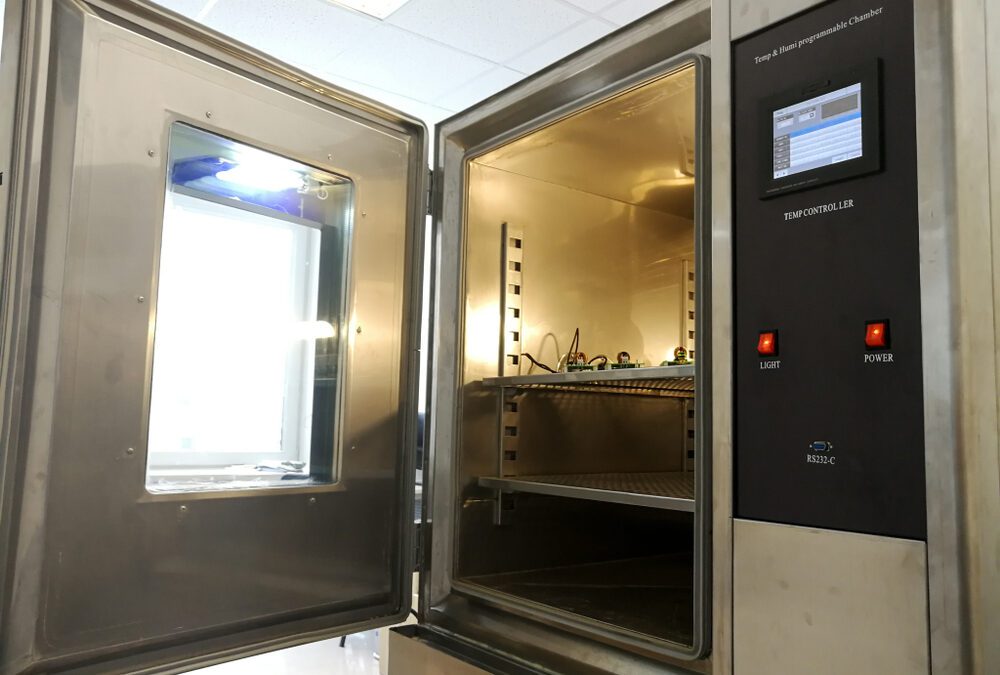Thermal testing is a critical practice that impacts everything from the electronics in your pocket to the safety of air travel. Here, we will explore this specialized form of non-destructive testing and provide valuable insights into its different types, applications across industries, and its indispensable role in ensuring product safety and longevity.
What Is Thermal Testing?
Thermal testing is a specialized form of non-destructive testing that evaluates a product’s performance and durability under various temperature conditions. The procedure exposes the product to a range of temperatures, helping to identify any potential weaknesses that could lead to failure in extreme or fluctuating environments.
Through thermal testing, manufacturers can identify the product’s safe operating temperature range and assess its expected lifespan under different thermal conditions.
Additionally, thermal testing serves as a compliance measure, ensuring that products meet safety standards and regulations. Its versatile application makes it a vital practice in numerous industries, from evaluating electronics and machinery to assessing building materials.
What are the Different Types of Thermal Testing?
The type of thermal testing conducted often depends on the nature of the product and the environment where it will be deployed. For instance, electronic devices may require different thermal testing than construction materials.
Thermal testing can sometimes be destructive, making it crucial to carefully select the correct test parameters and closely monitor the product throughout the test. With careful planning, researchers can minimize risks while ensuring the most accurate results.
Temperature Cycling Testing
Temperature cycling tests expose a product to various temperatures, typically ranging from sub-zero to above room temperature. This fluctuation in temperature can identify any weaknesses or failure points in the product that may manifest under extreme temperature conditions. The test helps manufacturers understand how a product will perform over its lifecycle in varying climates.
Thermal Shock Testing
Thermal shock tests subject a product to abrupt temperature changes, such as transitioning rapidly from hot to cold conditions or vice versa.
Thermal shock testing evaluates how a product responds to sudden temperature fluctuations, which is a frequent cause of failure for numerous devices. This type of thermal testing is essential for products that operate in environments with significant temperature fluctuations.
Heat Aging Testing
Heat aging testing places a product in elevated temperatures for an extended duration to simulate the aging process. This testing method helps estimate product lifespan and notes any potential alterations in performance or properties over time due to heat exposure.
Combined Thermal and Environmental Testing
Combined thermal and environmental tests assess the resilience of a product in a mixture of thermal and other environmental stressors, such as humidity, vibration, and shock.
Simulating conditions that mimic a real-world usage environment helps identify any vulnerabilities in its design that could compromise its performance or longevity.
What Products are Thermal Tested?
Thermal testing plays an indispensable role across a broad spectrum of fields. From electronics to aerospace, below are various sectors where thermal testing is crucial for ensuring product reliability and safety:
- Electronics: Thermal testing is critical in the electronics sector to ensure optimal performance in diverse temperature conditions. For example, smartphone manufacturers must test their products in environments simulating cold and hot extremes to ensure reliability.
- Medical Devices: Thermal testing is also essential in the medical field, particularly for life-saving devices like pacemakers and insulin pumps. These devices must perform flawlessly over a range of temperatures, including the complex environment of the human body itself.
- Aerospace and Defense: In aerospace and defense, thermal testing is indispensable. Products like aircraft and missiles are tested for their ability to withstand extreme temperature changes, such as those encountered at high altitudes or during launches, making it a critical aspect of their design process.
- Building Materials: Thermal testing strengthens the integrity of building materials like insulation and windows. This testing ensures the components maintain interior comfort and withstand even the most challenging weather conditions.
- Consumer Products: Everyday items, from coffee makers to hair dryers, also undergo thermal testing to ensure the safety of these products and their reliable performance under varying temperature conditions.
Why is Thermal Testing Important?
The importance of thermal testing stretches far beyond quality assurance. Thermal testing is a process that serves multiple purposes, affecting everything from consumer safety to a company’s market standing:
- Ensuring Safety and Reliability: In conditions where temperatures can vary widely, products are at risk of damage or failure, posing a significant safety concern for users. Thermal testing acts as a safety check, highlighting any vulnerabilities in a product’s design and verifying its ability to function safely and reliably in its intended environment.
- Validating Conformance to Safety Standards: Various industries have strict safety standards that require products to undergo intense temperature assessments. Thermal testing is critical for validating that these products meet safety benchmarks.
- Mitigating Product Recalls: The fallout from a product recall can be extensive, affecting both finances and brand reputation. Thermal testing allows companies to proactively identify any latent issues in a product before it comes to that.
- Cultivating Competitive Edge: Products that go through thermal testing tend to be safer, more reliable, and more resilient. This level of quality differentiates them in the market, providing a significant edge over competitors.
Thermal Analysis Made Easy With Parameter
From ensuring the reliable performance of electronics and medical devices to mitigating the risks of product recalls, thermal testing is a cornerstone in modern manufacturing and quality assurance.
When the stakes are this high, isn’t it worth learning how thermal testing could benefit your products? Contact us for more information about thermal testing or to discuss your specific testing needs.
Join the growing list of Parameter clients.
Please provide us with some basic information about your needs, and we’ll contact you to begin the quoting process.
If you’d rather start the conversation over the phone or by email, contact our sales department at 828-669-8717 or sales@humiditycontrol.com.

